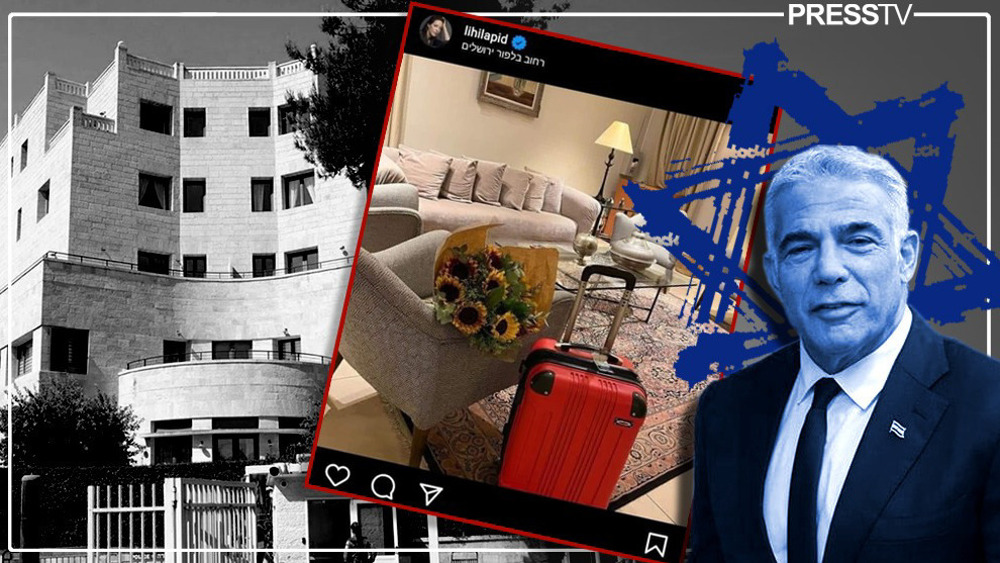By Sahar Salkhi
News has circulated about Israel’s new Prime Minister Yair Lapid’s staying in the occupied villa of a Palestinian businessman from al-Quds. Lapid’s wife also published a picture on social media networks after moving to the new residence, although it is said that this is a temporary stay and will be until the completion of the renovation of her official residence on Balfour Street.
In early July, Yair Lapid, the then-interim prime minister of the occupying regime, and his wife, Lihi, moved to an old and beautiful house in al-Quds, called Hana Salameh villa and abandoned by its owners during the Nakba Day, a move that shows his view of the conflict between Palestinians and Israelis and the violation of the rights of Palestinians, especially their right to return to their homeland.
Nakba Day is the name that Palestinians have given to the massacre and forced expulsion of their people by the Zionist soldiers in 1948, during which they were forced to leave their homes.
Salameh villa, which is located on Balfour Street, Talbieh neighborhood, is one of the beautiful villas that was constructed in the 1930s in Palestine with Art Deco style. There is still a sign in three languages at the entrance and in front of the building, which shows the history of the building construction in 1932, and the name of the designer and architect, Zoltan Harmet.
Zoltan Harmet was originally a Jewish Hungarian architect who went to Palestine and started working there a year after graduating from the Faculty of Architecture at Budapest University.
The owner of this villa, Hana Salameh, was an Arab-Christian merchant who owned the General Motors dealership in Jordan and Palestine before the Nakba and built it in the western part of al-Quds in 1932.
After the Nakba and the occupation and bombing of Palestinian neighborhoods in the western areas of al-Quds, especially the neighborhoods of Katamon and Talbieh, Hana Salameh left her villa and became a refugee in Beirut, and the occupying Israeli regime seized the villa by force under the Absentees’ Property Law.
The law allows the theft of the property of Palestinian refugees and gives the property since the time of its confiscation to Israelis, who are called “the guardian of absentee’s property.”
The Absentees’ Property Law also allows the Israeli occupation regime to confiscate Palestinian assets – including cash, stocks, furniture, books, companies, banks and other alienable assets. The main owners of these properties are mostly refugees from other countries, but some of them are internally displaced and now live in their occupied land.
After the villa was subject to usurpation law, it was occupied and taken over and was used by the occupying regime and leased out to foreign countries.
For a while, the villa was used to accommodate Israeli soldiers and marines, and for some time, it was the residence of the guards and bodyguards of the US Consulate on Agron Street (next to the endowments and the Ma’man Allah cemetery).
After that, the Guatemalan embassy was located there until 1980, when it left after the approval of the “United Jerusalem” law by the occupying regime. Then the villa was sold to an Israeli businessman who added three floors to the building of the villa to convert it into several apartments for rent.
And later again, for many years, this building was used for the residence of the guards and security services of the official residence of the occupying regime’s Prime Minister Benjamin Netanyahu, which is located on Balfour Street near this villa.
The two former Israeli prime ministers, David Ben-Gurion and Levi Eshkol, refused to live in Palestinian properties seized under the Absentees’ Property Law, making Lapid’s decision an oddity in Israeli politics. David Ben-Gurion, the commander of the Haganah forces, who committed ethnic cleansing crimes in Palestine, including the shelling of Palestinian homes in the western neighborhoods of al-Quds during his premiership, refused to move to live in the very Hana Salameh villa in his presidency.
Yair Lapid is considered to be the first prime minister of the Israeli occupying regime to have made this decision, which reveals the black truth about his positions regarding the right of return of the Palestinians and the future of al-Quds, and clearly shows that he is against this right.
Jihad Abu Raya, Palestinian researcher and lawyer in Haifa, says, “Lapid’s decision is reminiscent of Israel’s crimes against Palestinians. After expelling the Palestinians and massacring them in their villages and cities, Israel embarked on seizing their houses, factories, shrines, cemeteries, mosques, etc., and acts not as the guardian of such property, but as a thief and looter.”
(This article was written originally in Persian and translated to English by Press TV staff. The views expressed in this piece do not necessarily reflect those of Press TV.)
